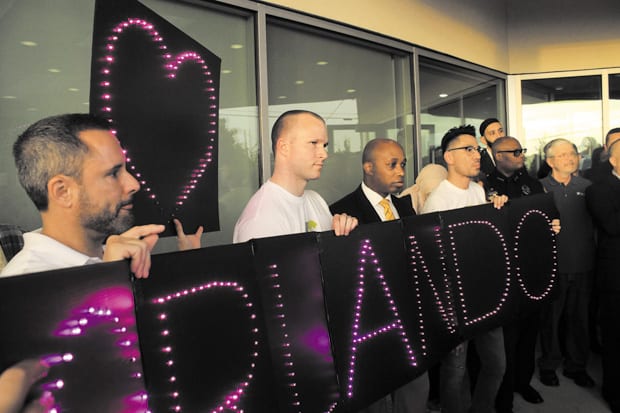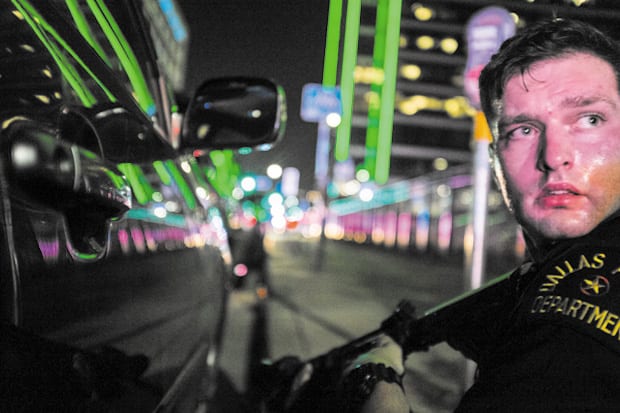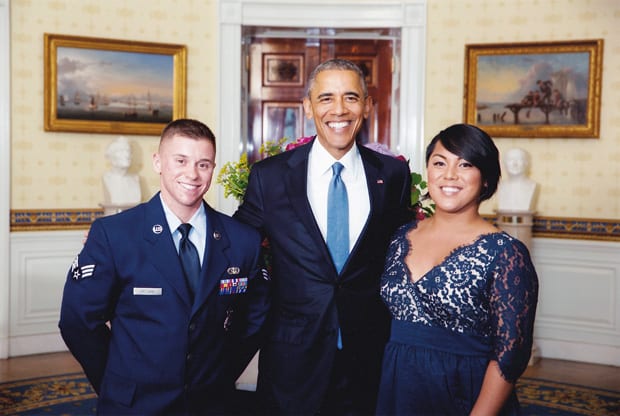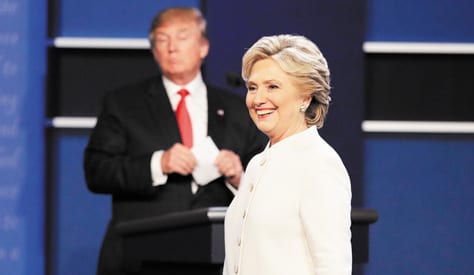
It has been a year of loss, of anger and of hate, and few of us are sad to see 2016 coming to an end. Join us as we take a look back at the top stories of this long and stressful year, and hopefully we can re-energize ourselves and prepare to fight the battles sure to come.
The race for president
Without a doubt, the biggest story of the year for our country as a whole was the race for president. While we had the chance to make history by electing not just the first woman president but one of the most-qualified candidates ever to run for the Oval Office. Instead voters chose to send a thin-skinned, narcissistic reality TV star with no experience in public office to the White House, and now the world waits nervously to see what the Twitter-addicted president-elect will say or do next.
The campaigns began in earnest in 2015, and Donald Trump launched his campaign for the Republican nomination with a racist attack calling Mexican immigrants rapists and drug dealers and in which he promised to build a wall along the U.S.-Mexico border to stop people from entering the country illegally. The wall became an ongoing theme for his campaign, a symbol to his followers that he would protect them from the threat of illegal immigration and at the same time a symbol to his opponents of the racism and bigotry they felt stained the candidate and his campaign.
The year began with 17 candidates vying for the Republican nomination. That field dwindled quickly, with experienced and qualified candidates falling beneath the weight of Trump’s popularity with the public. He took the podium at a campaign rally and made fun of a disabled reporter. He incited violence and encouraged his supporters to physically attack anyone who disagreed with him — everyone from protestors or members of what he called “the lying media” who dared show their faces at one of his events
Despite being caught in lie after lie, taking to Twitter to insult his opponents and proposing outrageous — even illegal — policies such as banning all Muslims from entering or re-entering the country or forcing Muslims to register with the government, the real estate mogul marched steadily onward, clinching the nomination by mid-May.
On the Democratic side of the equation, former first lady/U.S. senator/Secretary of State Hillary Clinton began her campaign looking like a shoe-in for the nomination. Vice President Joe Biden announced he would not run for president, and Clinton’s road to the White House seemed assured — until U.S. Sen. Bernie Sanders, left-wing independent from Vermont tossed his hat into the Democratic ring.
Although Clinton and Sanders began the year as friendly rivals, the campaign soon turned heated. Die-hard Sanders fans — who came to be known as the Bernie Bros — accused the Democratic establishment of stacking the deck against their candidate. Borrowing a page from the Republican playbook, Sanders supporters began trying to paint Clinton as an untrustworthy character with a shady past who was little more than a Republican wolf in Democratic sheep’s clothing. Clinton had clinched the nomination by early June. But Sanders supporters still marched into the Democratic National Convention in July demanding Sanders be named the nominee.
The Republicans held their national convention first, in Cleveland. Trump lined up a roster of D-list celebrities, like actor Scott Baio, and his own relatives to speak at the convention, and the candidate’s wife, Melania Trump, delivered a speech that was plagiarized in part from Michelle Obama’s 2008 DNC speech. Sen. Ted Cruz of Texas, a failed Republican presidential hopeful, embarrassed Trump with a speech in which he refused to actually back the nominee. And the convention produced the most anti-LGBT platform in the party’s history, even as Trump himself made history when he mentioned the June 12 massacre at the Pulse nightclub in Orlando and then became the first Republican presidential nominee in history to promise to protect the rights of LGBT people.
The DNC a week later in Philadelphia got off to a rocky start, with DNC Chair Debbie Wasserman-Schultz stepping down just before the convention started after Wikileaks released hacked emails from the DNC servers suggesting that the party favored Clinton over Sanders during the primary. And the Bernie Bros continued their calls for Sanders to be given the nomination, even as Sanders himself took the podium to endorse Clinton and urge party unity. As the convention progressed, things began to come together though and the week ended with Clinton’s triumphant and historic crowning as the first woman to win a major party’s nomination for president.
One of the featured speakers at the DNC was Khizr Kahn, accompanied by his wife, Ghazala, Muslim-American Gold Star parents of U.S. Army Capt. Humayun Khan, who was awarded the Purple Heart after being killed in Iraq protecting his fellow soldiers from a suicide bomber. Mr. Khan denounced Trump for attacking Muslims and other minorities and questioned whether the Republican had ever even read the U.S. Constitution, offering to lend Trump his copy. Trump responded by claiming he has worked very hard to create jobs and “made a lot of sacrifices.” He then insulted the couple further by suggesting that Mrs. Khan was not allowed to speak because the family’s religion forbid her to. (Mrs. Khan explained she chose not to speak at the convention because she was overcome with emotion for her lost son.)
Over the next three months, Clinton focused on reasoned policy proposals while Trump focused on name-calling and the already-settled issue of the email server Clinton used as Secretary of State. Clinton easily won all three of the debates between the two, coming in prepared and remaining calm as Trump rambled and relied on bully tactics to try and intimidate the Democrat.
Trump stumbled into gaffe after gaffe, many posted publicly on his by-then infamous Twitter account, and got caught in lie after lie. And Clinton appeared to have a practically insurmountable lead over the Republican candidate. But then, just days before the election, FBI Director James Comey announced his agency was re-opening his investigation into Clinton’s private email server, an investigation that had been closed months earlier with no action against the Democratic candidate. It turned out the emails in question were found on a laptop owned and used by Clinton aide Houma Abedin and her estranged husband, disgraced former Congressman Anthony Weiner who had been caught in yet another sexting scandal.
Days later Comey acknowledged that the emails in question had actually already been examined during the earlier investigation and were in no way relevant to Clinton or her candidacy. But by then the damage had been done and Clinton’s lead in the polls had evaporated. On Election Day, Clinton won the popular vote by nearly 3 million votes, but Trump claimed victory in the Electoral College, 306 to 232. And even though CIA officials confirmed that Russian hackers appeared to have tried to influence the outcome of the election in Trump’s favor and many people called for the Electoral College to choose someone other than Trump or to at least postpone its vote until questions were answered, electors voted Dec. 19 to make Trump president. Seven electors did defy the outcome of the popular vote in their states and refuse to cast their ballots for Trump, but in the end, it made no difference.
The massacre at Pulse

It was Latin Night during LGBT Pride Month at Pulse nightclub in Orlando and the place had been packed. But it was getting close to 2 a.m. on Sunday, June 12, and the crowd had begun to thin out by the time an American Muslim man named Omar Mateen walked in with two handguns and a semi-automatic rifle and opened fire on the some 320 people still there. Some of the bar patrons and employees ran, escaping out a back door or over the fence around the patio; others locked themselves in the office/dressing room area and others hid inside a bathroom.
Orlando police, alerted by patrons who had escaped, responded quickly, and a stand-off ensued. In a call to police, the gunman claimed he had attacked the nightclub in retaliation for American military involvement in Iraq and Afghanistan and was acting on behalf of ISIL. But his father later told police the man had seen two men kissing on a Miami street some weeks before and had been enraged at the sight. A former coworker of the security guard/failed police recruit told investigators the shooter “had a lot of hatred for people. Black people, women, he did not like Jews, he did not like Hispanics, nor did he like gay or lesbian people.”
As the world began waking up to news of the attack, initial reports suggested 12 people were dead. But the death toll rose quickly, and when all was said and done, 49 people were dead plus the gunman, who was killed by police, and more than 50 others were injured.
It is the deadliest mass shooting by a single gunman in U.S. history.
And the country began to mourn. As friends and family members gathered that morning outside of Pulse to learn the fate of their loved ones who had been inside,
LGBT people and their allies around the country — the world — began gathering for vigils. In Dallas, more than a 1,000 people gathered at Resource Center’s newly-opened Community Center on Cedar Springs Road at Inwood, then marched to the Legacy of Love Monument on Oak Lawn, in the heart of the gayborhood. The event drew a variety of speakers, including city officials, such as Mayor Mike Rawlinghs and Police Chief David Brown, and representatives of a Muslim mosque in Irving.
On Monday night, hundreds crowded into the sanctuary of Celebration Community Church in Fort Worth for a candlelight vigil there. Mayor Betsy Price and Police Chief Joel Fitzgerald participated in the service, as did religious leaders from a number of churches and organizations in the city.
Even after the gunshots ended that Sunday morning, echoes of the violence continued to echo through the LGBT and the U.S. as a whole. Later that same day in Los Angeles a man who had numerous guns in his car was arrested, telling police he was on his way to that city’s Pride parade. Here in Dallas, people already worried about ongoing attacks on gay men in Oak Lawn, were even more on edge. Police were called several times to investigate possible threats at locations on Cedar Springs. When Dallas and Fort Worth Pride parades were held some four months later, extra security measures were put in place to protect against a similar attack.
Even some of those seen as enemies of LGBT equality expressed their sorrow over the attack, despite the fact that some of those condolences rang false in the ears of LGBT men and women who have so often Although the shooter’s motive was never completely clear, the attack became yet another symbol of what many see as the growing wave of anger, bigotry and violence around the world, epitomized in the U.S. by the victorious presidential campaign of Donald Trump.
Dallas police shootings

On July 7, Micah Xavier Johnson ambushed Dallas Police and DART officers working at a Black Lives Matter march in downtown, killing four DPD officers and one DART officer, and injured five other officers and two civilians.
The shooting started during a peaceful protest march through the streets of downtown, organized in response to the killings of two black men by police officers within a week: Alton Sterling was shot to death by a Baton Rouge, La. police officer responding to a call of a man with a gun outside a convenience store, and Philando Castile was shot to death by a police officer in St. Anthony, Minn., during a traffic stop as his girlfriend, who was driving, live-streamed the incident on Facebook. Video of Sterling’s death was also posted online.
Tensions were running high between law enforcement and African-American communities around the country in the wake of the two shootings that happened within days of each other. But in Dallas, the protestors and police officers were working together to keep the event peaceful. About 100 police officers who had been assigned to the march were interacting with the crowd, taking selfies with marchers, when gunfire broke out. Among the officers protecting the crowd were DART police. Video taken during the shooting showed officers running toward the commotion, putting themselves between the marchers running for cover and the apparent location of the gunman.
Former Dallas Voice publisher and owner Robert Moore, who has been making a name for himself as a street photographer since retiring from publishing, lives downtown and was on the street with his camera when the shooting started. A Dallas officer pulled Moore down behind a car for cover from the gunfire, and Moore’s photo of the young officer went viral the next day.
After shooting up parts of an El Centro College classroom building, the gunman holed up in an old parking garage buttressed with wide pillars. Because officers could not get a clear shot at him, they sent in a robot with an explosive that killed him.
Among the injured were DART police officers. Unlike the Dallas officers who received full pay, the DART officers were only offered workman’s compensation and expected back at work within weeks of the shootings.
Dallas held a memorial service in Thanksgiving Square the morning after the shootings attended by thousands. Mayor Mike Rawlings carefully orchestrated the event. Although Lt. Gov. Dan Patrick attended, he was not allowed to speak to a crowd that would not have tolerated a message that most expected would blame the Black Lives Matter movement for the tragedy. Instead, Patrick stood just behind each of the speakers.
Two days later, President Barack Obama and first lady Michelle Obama traveled to Dallas for a memorial service honoring the officers at the Meyerson Symphony Center. They were joined on stage by former President George W. Bush and former first lady Laura Bush, and Vice President Joe Biden and his wife, Dr. Jill Biden.
Because the event was for the fallen officer’s families and for Dallas police officers, Arlington police patrolled the event and controlled access to the building. TV news crews were kept out of the building and only print reporters allowed inside.
“Today our nation grieves,” Bush said. “Those of us who call Dallas home lost five members of our family.” He called Dallas police an inspiration for the country in a speech that was probably his most eloquent ever.
Chief David Brown serenaded his officers from the stage with Stevie Wonder lyrics, prompting President Obama to remark he was glad he met Michelle first, because she loves Stevie Wonder.
Bush and Michelle Obama ended the ceremony as they joined hands, stood and swayed, leading a rendition of the hymn “Glory Hallelujah.” Everyone in the audience and on stage did the same — including Rep. Eddie Bernie Johnson, who joined hands with the person sitting next to her — her political nemesis Sen. Ted. Cruz.
Just a couple of months after the shooting, Brown resigned as Dallas police chief because of the stress and grief he felt as a result of the killings and injuries.
Ups and downs for transgender Americans

After losing the battle over marriage equality to the U.S. Supreme Court’s June 2015 Obergefell ruling, opponents of LGBT equality turned their attention to the community’s most vulnerable members — transgender men and women.
Efforts by anti-trans Texas lawmakers to restrict transgender rights had failed to pass during the 2015 legislative session, but equality opponents didn’t give up. And the same pattern of victory followed by renewed attacks and losses repeated around the country.
In February, the Charlotte, N.C. City Council approved an ordinance protecting LGBT from discrimination. Irate Republican lawmakers retaliated by calling a special session a month later for the specific purpose of enacting House Bill 2, legislation over-riding local anti-discrimination ordinances protecting LGBT people and then going a step further to prohibit transgender men and women from using the appropriate public restroom facilities. Gov. Pat McCrory signed the bill into law within hours.
The law set loose a firestorm of controversy that would eventually cost the state of North Carolina millions in terms of lost employment with companies eithermoving offices out of the state or changing their plans to relocate to North Carolina and going elsewhere, along with entertainers who cancelled appearances there, and sporting events moved from the state and other businesses and government’s banning business travel by employees to North Carolina. And that’s not even counting the tourism dollars the state lost to HB2.
In May, after Fort Worth ISD Superintendent Kent Scribner released guidelines for district employees on putting into practice previously enacted policies for treatment of transgender students, opponents of transgender equality flooded the administration with complaints, claiming the district was trying to keep secrets from parents and cut off parents’ involvement in students’ lives. Advocates on both sides of the issue packed a school board meeting to voice their opinions, with trans rights supporters coordinated by Fairness Fort Worth President David Mack Henderson, while trans-rights enemy Lt. Gov. Dan Patrick traveled to Fort Worth to hold a press conference outside the school board meeting calling for Scribner to resign for overstepping his bounds.
The school board held a series of public hearings and town halls, eventually releasing revised guidelines intended to still protect students while reiterating parents’ rights regarding access to information about their children. State Sen. Konni Burton, however, has pre-filed a bill for the 2017 legislative session that LGBT advocates fear could force teacher, counselors and other school employees to out LGBT students to their parents.
But the trans community marked a giant victory when, on June 30, U.S. Defense Secretary announced that transgender people would be allowed to serve openly in the U.S. military. Carter, saying that the change was the right thing to do, noted that trans servicemembers should be able to start receiving medical care and formally changing their gender identifications in the Pentagon’s personnel system by Oct. 1 of this year. By the summer of 2017, he said, the military will begin allowing openly transgender individuals to enlist as long as they meet required standards and have been stable in their gender identity for at least 18 months.
But the battle continues. Bills challenging hard-won rights for trans people and others in the LGBT community have already been prefiled for the 2017 Texas legislative session. And Lt. Gov. Dan Patrick has pledged to make passage of his so-called Women’s Protection Act — a Texas version of North Carolina’s HB 2 — one of his legislative priorities next year.
As the year drew to a close, it seemed that North Carolina lawmakers had come to their senses. In a deal arranged by Democratic Governor-elect Roy Cooper, Charlotte City Council members agreed to repeal their nondiscrimination ordinance, and Republicans in the legislature agreed to meet in special session to repeal HB2. The city council repealed its ordinance on Monday, Dec. 19, but Republicans in the General Assembly reneged on their part of the bargain, refusing to repeal HB2 when they convened on Wednesday, Dec. 21.
And the battle continues.
Resource Center reaches goals

After a multi-year, $8.3 million capital campaign, Resource Center opened its new community center on Cedar Springs Road in May, on property adjacent to Cathedral of Hope. Visitors arriving in Dallas through Love Field may see the triangular building from the air as it’s on the final glide path to the airport and those driving to downtown will pass by city’s new landmark if the follow Cedar Springs out of the airport parking lot.
Rather than sell the old buildings, Resource Center decided to convert its 2701 Reagan property into the agency’s Health Campus and continue operations at the Nelson-Tebedo Clinic on the Strip on Cedar Springs. The agency simultaneously embarked on a total renovation of the old property even before the new one was complete.
The new building opened in May and the old property reopened in November.
Two weeks after the opening of the new location on Cedar Springs Road, the Pulse massacre happened. That evening, more than 1,000 people including religious figures and elected officials gathered at the center for a vigil that accentuated just how much the new building would mean to the community.
The health campus was purchased in 1990 from Cathedral of Hope, after it began construction on its current building.
Today, the two-building Health Campus houses the food pantry, hot meals program, counseling rooms, cyber center and the insurance program.
The Nelson-Tebedo Clinic continues doing testing and remains the only HIV organization doing dental work in Dallas.
The new building is home to new and continuing programs. A counseling center is based in the new property with expanded counseling service with full-time staff.
An intern program operated in conjunction with Southern Methodist University School of Education continues. Youth First had dedicated space in the building and groups such as Gray Pride senior programming and GEAR, the transgender services program, operate from the new location.
Resource Center is one of just a couple of community centers in the country with multiple properties and is one of the four or five largest in the U.S.
In recognition for her work, Dallas Voice named CEO Cece Cox our LGBT Texan of the year.
…………………….
In Memoriam
Karen Estes:
After a disastrous fire on Cedar Springs destroyed the AIDS Resource Center, Karen got the center up and running in a matter of hours and later became its co-executive director.
Bill Eure:
Husband of longtime Cathedral of Hope pastor the Rev. Michael Piazza, Bill helped lead the Dallas LGBT church to national prominence.
Jack Evans:
One of the pillars of Dallas’ LGBT community, was finally was able to marry his partner of more than 50 years, George Harris, in 2015. Jack died a day short of their one-year anniversary.
David Mack Henderson:
In the aftermath of the raid on the Rainbow Lounge, “D-Mack” helped form Fairness Fort Worth and helped shape new policies and ordinances all over Tarrant County. This year he lead the fight against anti-trans forces attacking Fort Worth ISD policies.
Jean Nelson:
An icon in the LGBT community, she was the loving and supportive mother of the late activist Bill Nelson.
This article appeared in the Dallas Voice print edition December 30, 2016.















